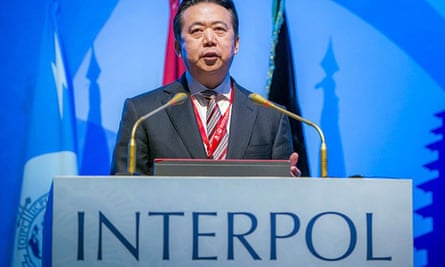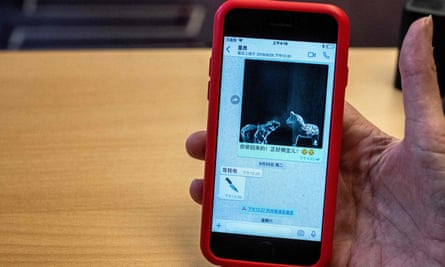Slight, urbane and with a doctorate in economics, Grace Meng seems an unlikely candidate to take on the might of the Chinese state.
Until last month she was living in expatriate obscurity in the French city of Lyon, where her husband, Meng Hongwei, served as the first Chinese head of Interpol – apparently a great source of national pride. Then, on a routine visit home in September, he vanished. He sent her a short message: “Wait for my call,” followed by an emoji of a knife, then silence. His call never came.
Within two weeks Grace Meng was catapulted on to front pages worldwide, accusing Beijing of persecution after Chinese authorities admitted her husband had been detained and was under investigation for corruption. She insists he is innocent, and says the charges are a vendetta driven by rivals in the security ministry, where he held the post of vice-minister while serving at Interpol. The case has cast a spotlight on China’s authoritarian system, and the government’s willingness to disregard international norms and borders in its pursuit of domestic goals.
For decades, Meng Hongwei helped run the security system that eventually swept him up. But when his turn came there was one crucial difference from the vast majority of the families torn apart by opaque charges and arbitrary detentions. In France, his wife felt far enough beyond Beijing’s reach to speak out.
“It’s not justice,” she said, in an interview in Lyon where she slipped between English and her native Mandarin. “I can tell you this because I am sitting here [in France]; other people can’t tell the truth.
“I think the anti-corruption campaign in China has already been damaged. It has become a way of attacking people who are your enemy,” she said, rejecting any claims of graft.
Grace Meng is also frustrated that the organisation her husband once headed is moving on so fast. This week Interpol will hold a general assembly where members will vote for his replacement, without investigating his disappearance or whether a curt resignation note submitted by Beijing had been written under coercion. “The most basic responsibility of my husband Mr Meng, and everyone who works at Interpol, is to guard everyone’s safety … This is the reason they exist,” she said.
Her husband’s abrupt disappearance from such a high-profile position produced headlines worldwide, with readers fascinated by how the head of an organisation set up to police the world could himself vanish. It was nearly two weeks after his last message – and only after his wife filed a missing persons report with French police and Interpol sent a formal request to China for information – that Beijing finally admitted Meng Hongwei was under investigation.

Photograph: EPA
Grace Meng’s decision to speak out about her husband’s detention is unusual. Critics inside China risk being rounded up, but the increasingly authoritarian government has long looked to silence those beyond its borders as well. Some have been seized far outside China’s legal jurisdiction and returned home by force; others are silenced by fear that criticism could rebound on loved ones who are still in China.
Mindful of the risks, French authorities have put Grace Meng under 24-hour police protection. The location of the Observer’s interview was changed at the last minute for security reasons. She does not wish to pose for photographs that show her face and is keeping key details of her identity, including her Mandarin name, secret.
The main reason she is speaking out, she says, is the couple’s two young sons. “Becoming a mother made me very brave,” she said, in an interview in which she was generally composed but became tearful when she spoke about her boys. “Because of them I have the courage to stand up, so that when our children grow up they won’t face this kind of China – where children suddenly can’t find their father, wife has lost her husband.”
She refused to comment on whether the family had sought political asylum in France, but acknowledged they were unlikely to return home soon. “The whole world knows what the situation is like in China, and anyone can imagine what will happen if I and my children go back to China.”
Chinese dissidents may see a certain bitter irony in her quest for justice. As vice-minister of security, Meng Hongwei sat near the apex of a system which ripped apart families the way hers has now been torn. And while he presided over Interpol, it issued a flurry of “red notices” for the arrest of dissidents from countries including China and Russia.
His wife said he was a technocrat who dealt with practical aspects of policing, from the coastguard to traffic violations. He followed the organisation’s rules meticulously, she said.
Whatever the truth or otherwise of the allegations against him, the nature of his detention means he will be deprived of due process, said Sophie Richardson, China director at Human Rights Watch. It also means there will be no chance of finding justice for those he might have mistreated. “Don’t expect Meng ever to be held accountable for the countless people, including rights activists, whose arbitrary detention, torture and mistreatment he oversaw in China’s ministry of public security,” she wrote in the Washington Post.
Meng’s disappearance and his wife’s willingness to talk about it have refocused attention on President Xi Jinping’s anti-corruption crackdown, seen as both a populist move to tackle a cause of dissatisfaction among Chinese citizens, and an effective way to tighten his grip on power.

Meng Hongwei’s abrupt removal is likely to slow China’s recent initiative to secure leadership roles in international organisations, but Beijing appears to have prioritised the corruption crackdown – and perhaps the message that no one is too senior or too distant to be targeted.
His disappearance also raised questions about the mission of Interpol, an organisation set up to police the world that apparently cannot or does not want to pursue the disappearance of its own president.
Grace Meng says the organisation has not been in touch with her since her husband disappeared. She has sent it a threat of legal action over its failure in its duty to protect the family, and twice asked for an appointment with top officials, but had no response.
One of her questions is why Interpol has not tried to verify her husband’s resignation letter. “In my husband’s case, we don’t know who wrote his resignation,” she said.
Her position is backed by a former secretary general of 14 years’ standing, who condemned the organisation on Twitter for incompetence. Interpol “improperly validated a potentially involuntary resignation”, Ronald Noble, who ran the organisation from 2000 to 2014, said. “The secretary general had no authority to accept it. [Meng Hongwei] remains president because Secretary General [Jurgen] Stock failed to insist that China prove that the resignation was voluntary.”
Grace Meng is still telling her children that their father is on a long business trip, but knows the longer the absence stretches on, the harder it is to feign normality. “They recently asked ‘when will daddy come back?’, which for me is very painful and difficult. They are very perceptive, and they have sensed that there are some special circumstances.”
As delegates gather for their assembly, she implored them to remember their mission to bring greater safety to the world. Their former president needed it now, she said. “Trust Mr Meng, he always guarded the reputation of Interpol,” she added.
